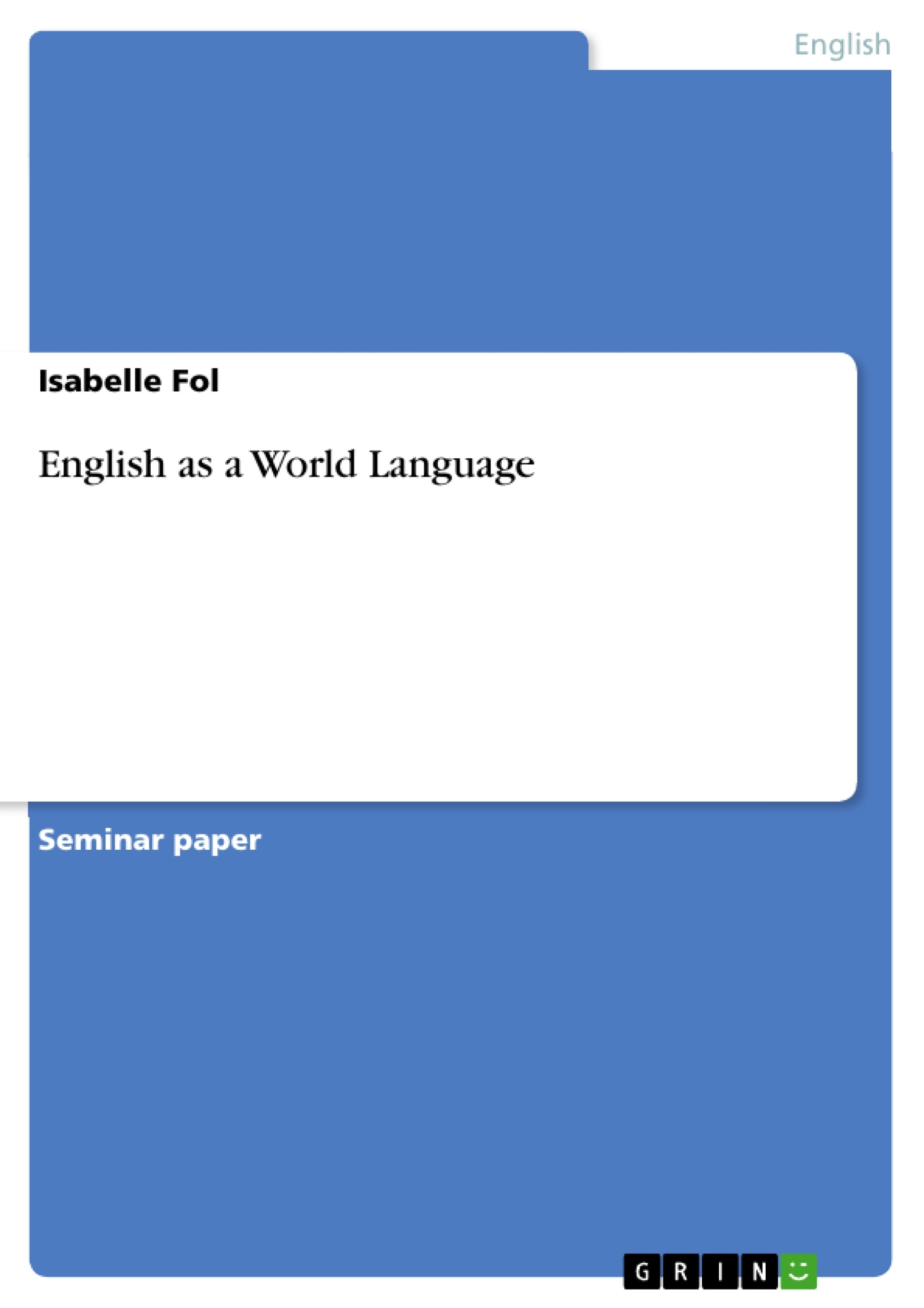English as a world language- a challenging topic that is fully treated in literature, because it is a
topic of general interest. But during my researches, I realized that it was difficult to find
literature about linguistic reasons for the establishment of English as a world language. Since
this aspect is often interwoven within other reasons, for example geo-political reasons,
linguistic reasons are seldom explicitly stated. Frequently, mixtures of reasons that have finally
helped English to reach its high eminence as a world language are presented. In the end, I found some important aspects by picking them out of different texts and books and confined myself to present three important linguistic reasons for the establishment of English as a world language. Therefore, this paper does not claim to be complete, otherwise it
would extend the prescribed lenght of the paper.
Table of Contents
- Preface
- Table of Contents
- Introduction
- The Current Status of English Around the World
- Definitions
- The Establishment of English as a World Language - Not Only Considered From the Linguistic Point of View
- Linguistic Reasons for the Establishment of English as a World Language
- The Simplicity of English
- Varieties of English
- English-Based Pidgins and Creoles
- Conclusion
- Bibliography
- Appendix
Objectives and Key Themes
This paper aims to explore the linguistic reasons behind English's rise as a global language. It investigates why English, amongst all languages, achieved such prominence, focusing on linguistic factors rather than geopolitical or historical influences. While acknowledging the interplay of various factors, the paper prioritizes a detailed analysis of linguistic elements that contributed to English's success.
- The simplicity of English grammar and vocabulary
- The emergence and spread of various English dialects and varieties
- The role of English-based pidgins and creoles in global communication
- The impact of English on scientific terminology and communication
- English's role in international relations, diplomacy, and commerce
Chapter Summaries
Introduction: This introductory chapter establishes the paper's central question: Why has English achieved global dominance? It highlights the unique nature of English's spread and its status as the most significant world language (excluding Mandarin). The chapter outlines the paper's focus on linguistic factors, contextualizing them within a broader understanding of the factors that contributed to English's success. It previews the structure of the paper, promising an examination of the current status of English, relevant definitions, and a detailed analysis of three key linguistic reasons for its global dominance.
The Current Status of English Around the World: This chapter details the remarkable global spread of English, contrasting its current dominance with its relatively humble beginnings in Britain. It emphasizes English's unparalleled position as a world language, citing its vast number of speakers, both native and non-native, and its crucial role in various spheres. The chapter highlights English's impact on science, its function as a diplomatic language, and the existence of numerous English varieties worldwide, underscoring the multifaceted nature of English's global presence.
Keywords
English as a world language, linguistic reasons, language spread, language dominance, simplicity of English, English varieties, pidgins, creoles, scientific vocabulary, international relations, diplomacy, global communication.
Frequently Asked Questions: A Comprehensive Language Preview
What is the main topic of this paper?
This paper explores the linguistic reasons behind English's rise as a global language. It focuses on linguistic factors, such as the simplicity of English grammar and vocabulary, the emergence of various English dialects, the role of English-based pidgins and creoles, and the impact of English on scientific terminology, to explain its global prominence.
What are the key themes explored in the paper?
The key themes include the simplicity of English grammar and vocabulary, the spread of various English dialects and varieties, the role of English-based pidgins and creoles in global communication, the impact of English on scientific terminology and communication, and English's role in international relations, diplomacy, and commerce.
What is the structure of the paper?
The paper begins with an introduction that establishes the central question and outlines the focus on linguistic factors. It then explores the current global status of English, provides relevant definitions, and delves into a detailed analysis of three key linguistic reasons for English's global dominance. This is followed by a conclusion, bibliography, and appendix.
What is the scope of the chapter on "The Current Status of English Around the World"?
This chapter details the global spread of English, contrasting its current dominance with its origins. It highlights English's role in various spheres, including science and diplomacy, and emphasizes the existence of numerous English varieties worldwide.
What are the key linguistic reasons for English's global dominance according to this paper?
The paper identifies three key linguistic reasons: the simplicity of English grammar and vocabulary, the emergence and spread of various English dialects and varieties, and the role of English-based pidgins and creoles in global communication.
What is the role of English-based pidgins and creoles in English's global dominance?
The paper highlights the significant contribution of English-based pidgins and creoles in facilitating global communication and contributing to English's widespread adoption.
What other factors are mentioned, besides purely linguistic ones, that contributed to English’s success?
While the paper primarily focuses on linguistic factors, it acknowledges the interplay of various other factors, such as geopolitical and historical influences, in contributing to English's success. However, these are not the primary focus of the analysis.
What is included in the "Chapter Summaries" section?
The "Chapter Summaries" section provides brief overviews of the Introduction and the chapter on "The Current Status of English Around the World," highlighting the main points and arguments presented in each chapter.
What keywords are associated with this paper?
The keywords include: English as a world language, linguistic reasons, language spread, language dominance, simplicity of English, English varieties, pidgins, creoles, scientific vocabulary, international relations, diplomacy, and global communication.
- Citar trabajo
- Isabelle Fol (Autor), 2001, English as a World Language, Múnich, GRIN Verlag, https://www.grin.com/document/44206



